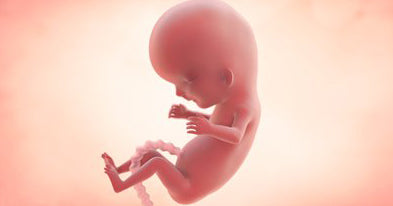
Help your baby develop in your tenth week of pregnancy
Your baby is now looking like a human. See what features are developing this week.
What’s happening this week?
Your little one now measures around 2.5 centimeters longi and is looking more like a human. The ears are starting to develop on the sides of your baby's head, and inside the head, his or her ear canals are forming.
The upper lip and two tiny nostrils in the nose are also visible and the developing jawbones already contain all your little one’s future milk teeth. The heart is fully formed and beats 180 times per minute – two to three times faster than your ownii.
Your baby is making small, jerky movements, which can be seen on an ultrasound scan. Amazingly, your baby’s brain is active by now and has brain waves.
What can you expect?
Increased urine production is a common symptom at this pregnancy stageiii due to hormonal changes. Use these tips to manage this symptom and to maintain your pregnancy well-being:
- Cut down on caffeinated beverages. Drinks such as coffee and tea have a diuretic effect, which compels you to head to the bathroom frequently.
- Stay hydrated. Don’t be deterred from drinking plenty of water; it is important for a healthy pregnancy.
What can you do to support your pregnancy?
Continue to eat a balanced diet with plenty of fresh fruit and vegetables and take a pre-natal supplement as recommended by your healthcare provider. Your baby’s brain cells are multiplying rapidly.
You can power the development of crucial regions in the brain by providing choline, DHA, and folate daily to your babyiv. Some food items rich in these nutrients that you may want to add to your diet are fatty fish, eggs, spinach, and beans.
Remember:
- Stay as stress-free as possible, mom-to-be, as your negative emotions may have a bearing on your developing babyv.
- Engage in activities that help you feel calm, such as reading, gentle exercise, prenatal yoga, crafts, and other hobbies like indoor gardening.
- A warm bath at the end of a long day can also help soothe you and wash away your anxieties.



